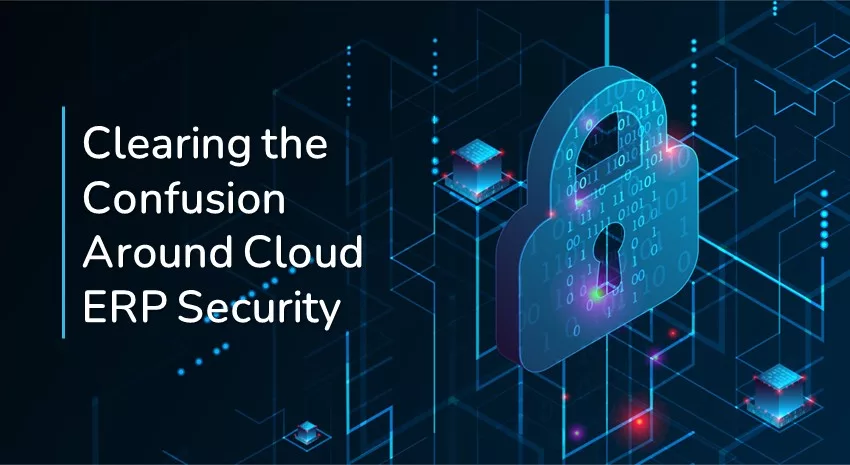Clearing the Confusion Around Cloud ERP Security

There’s a lot of misinformation, in general, around Dynamics Business Central SaaS upgrades and one of them is cloud ERP security. Of course, the move to cloud ERP allows companies to outsource hosting, maintenance, and expenses around in-house data centers, but the move away from on-premises means less control over ERP database servers.
While SaaS ERP implementations are growing, there’s still a lot of confusion and misinformation around robustness of cloud ERP security.
It’s understandable, as cyber attacks are big business. Ransomware incidents grew by 41% in 2021 and the time to resolve these incidents increased by 49 days. Plus, attacks are evolving, and numerous types of cybersecurity messaging can be overwhelming for senior managers at mid-size companies.
According to a 2022 Thales Security Report, 26% of businesses in the survey have experienced an increase in malware and ransomware attacks, and 19% have identified more phishing and whaling – high value target – attempts compared to 2021.
That’s why cybersecurity best practices and education for IT managers around Cloud ERP security are crucial in 2022 and going forward. Many IT departments are in a cat- and mouse- game with malware and cyber attackers. And, for now, the solution is implementing a comprehensive security approach that focuses on user data security, permissions policies, and cyber awareness training for employees.
As we’ll show in this post, cloud native security controls are a good first line of defense but they need to be combined with a comprehensive security approach to give businesses the best chance to stop expensive cyber attacks.
Demystifying Cloud ERP Security Management
Cloud service providers, such as Microsoft Azure , and their products offer native security controls that can drive an end-to-end security posture. For example, everything sent within an Azure environment is automatically encrypted and the network has automatic detection to prevent distributed denial-of-service (DDoS) attacks.
Plus, regular hardware and firmware code revisions help protect against threats before software is loaded and active. Automatic smart traffic monitoring and profiling can also detect and deflect threats that look out of the ordinary.
One area of concern for any type of server management, be it on premises or cloud, is misconfiguration. In VMware’s 2021 State of Cloud Security report, one in six companies surveyed experienced a cloud data breach due to a misconfiguration in the past year.
Cybersecurity Tools and Policies Meet Cloud ERP Security
While data breaches due to misconfigurations occur, cyber security companies are increasing their network and server monitoring with new technology. For example, BlackPoint Cyber is a third-party cyber security company that offers 24/7 Managed Detection and Response technology. This service continuously examines suspicious data packets and login events on your network, along with server monitoring. The unique value of BlackPoint is its ability to recognize network and data oddities quickly, and then elevate these suspicious incursions to security analysts immediately.
Besides new monitoring technology, a comprehensive set of policies centered around device management and access policies are critical for any cloud ERP system. In the cybersecurity segment, this is known as identity and management (IAM) policies, and these are essential to cloud security in any distributed workforce setting.
The distributed work environment forces IT departments to enact end-to-end security management policies. In 2021, 85% of all data breaches involved a human element and the focus for IT must be sign-in integrity and device management policies. One way to manage permissions in a SaaS environment is with Microsoft’s Intune. Intune is a cloud-based service that focuses on mobile device management (MDM) and mobile application management (MAM), which includes devices like mobile phones, tables, and computers.
Intune integrates with Azure Active Directory to control who has access and when they can access. The is important as IT needs to set rules and configure settings on personal and organization-owned devices to access data and networks.
The overall message for companies moving to a cloud ERP system such as Microsoft Dynamics 365 Business Central, is robust data management and permissions policies that are currently happening with on premises applications, need to be carried over to the cloud. Confusion around cloud security should be easily dispelled by IT managers, as more cybersecurity education gains traction for users and senior management in 2022 and beyond.
ArcherPoint Can Help You Answers Questions about Migrating to the Cloud
Cloud computing is the wave of the future and present, but migrating from your current on premises ERP to a SaaS environment is complex. ArcherPoint is a Microsoft Dynamics ERP Gold Partner and Cloud Solution Provider, and we can help you start your journey to Dynamics Business Central 365 SaaS. Find out how ArcherPoint can help you tailor the right ERP solution for your unique business needs.

